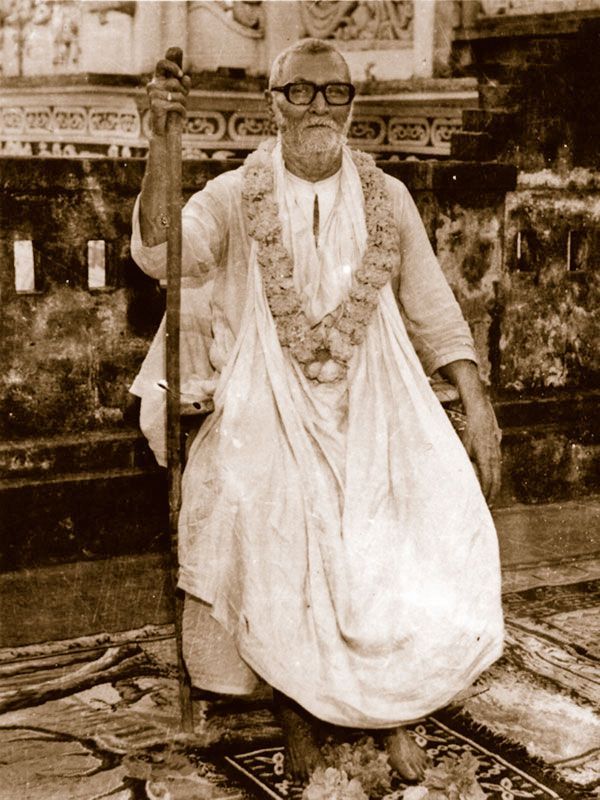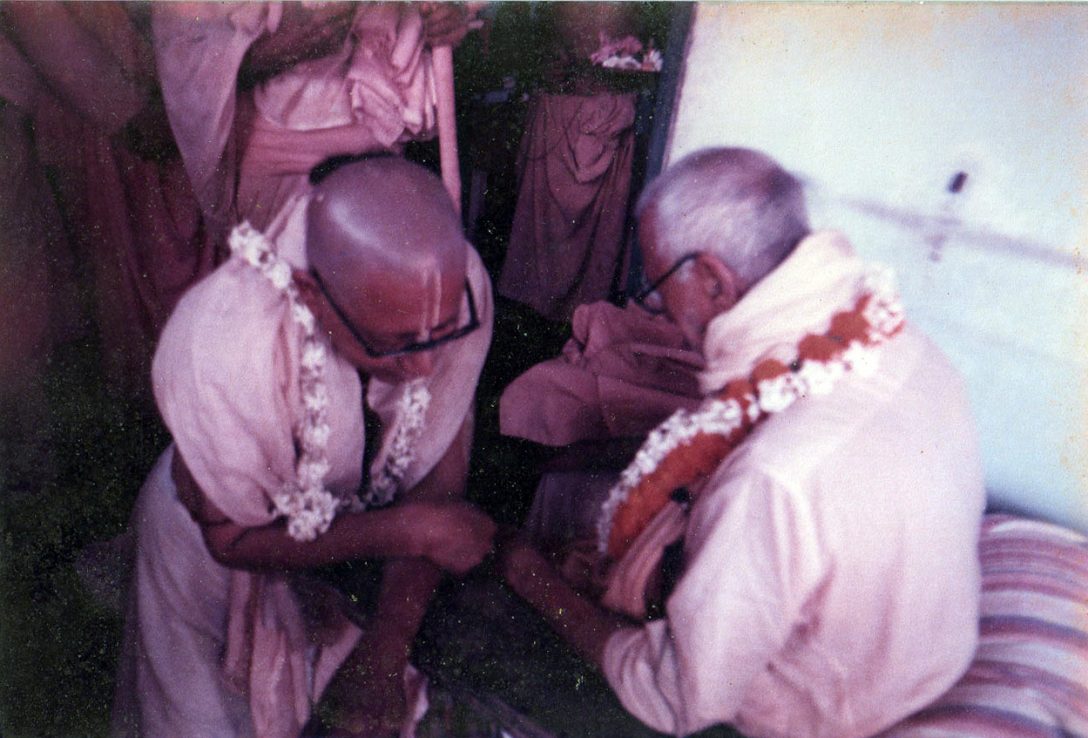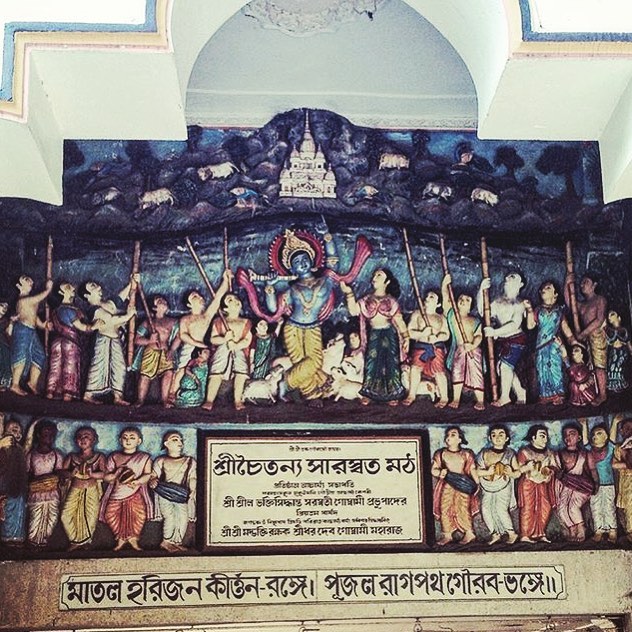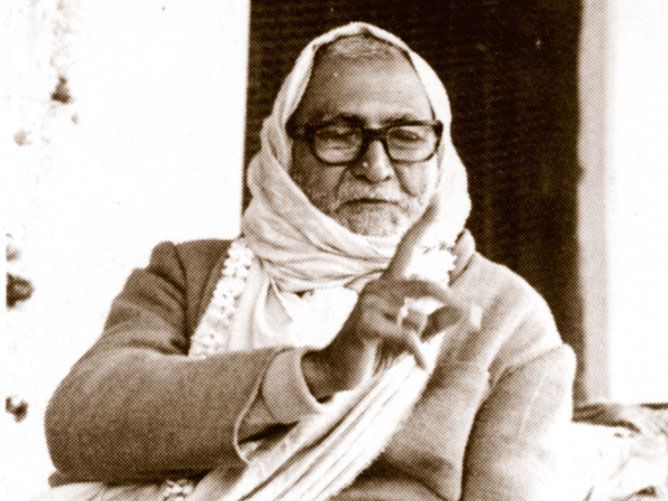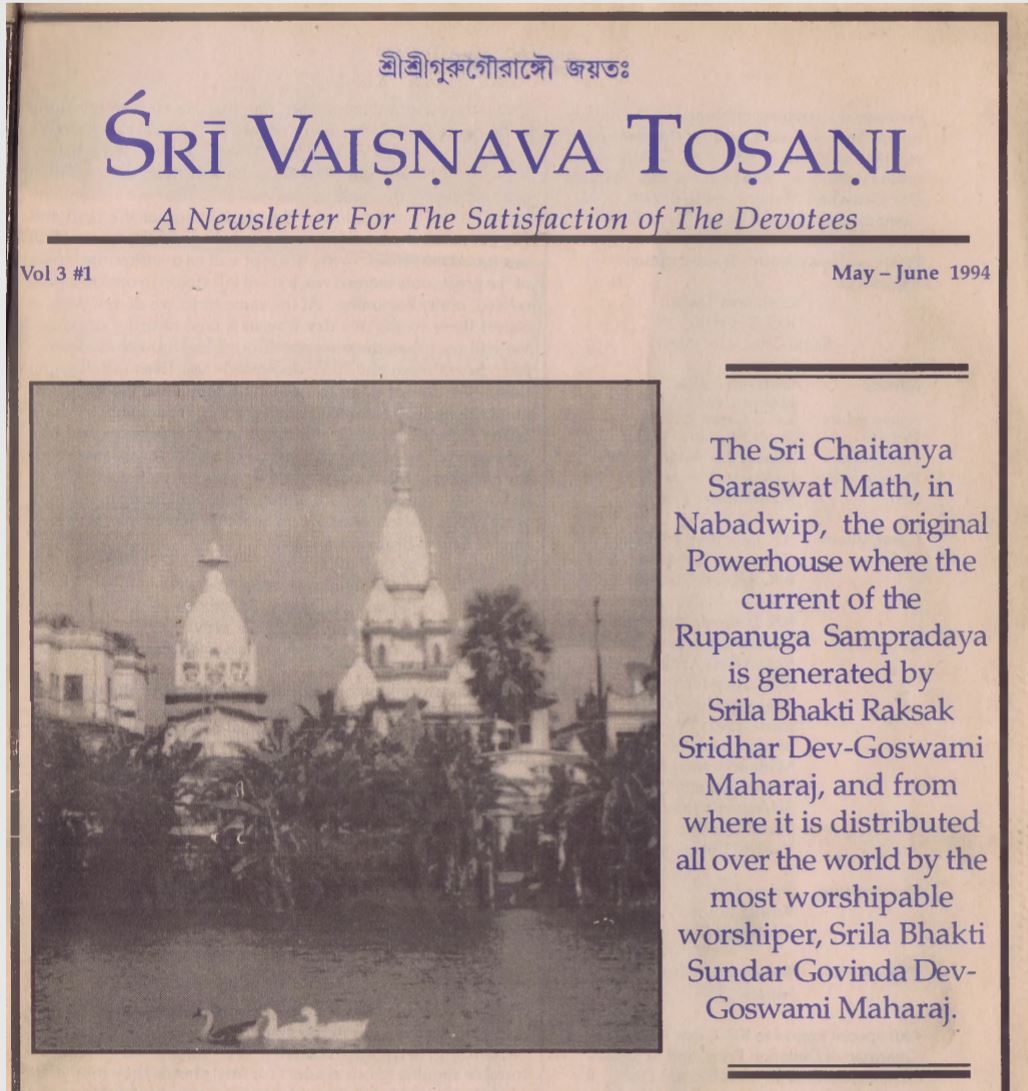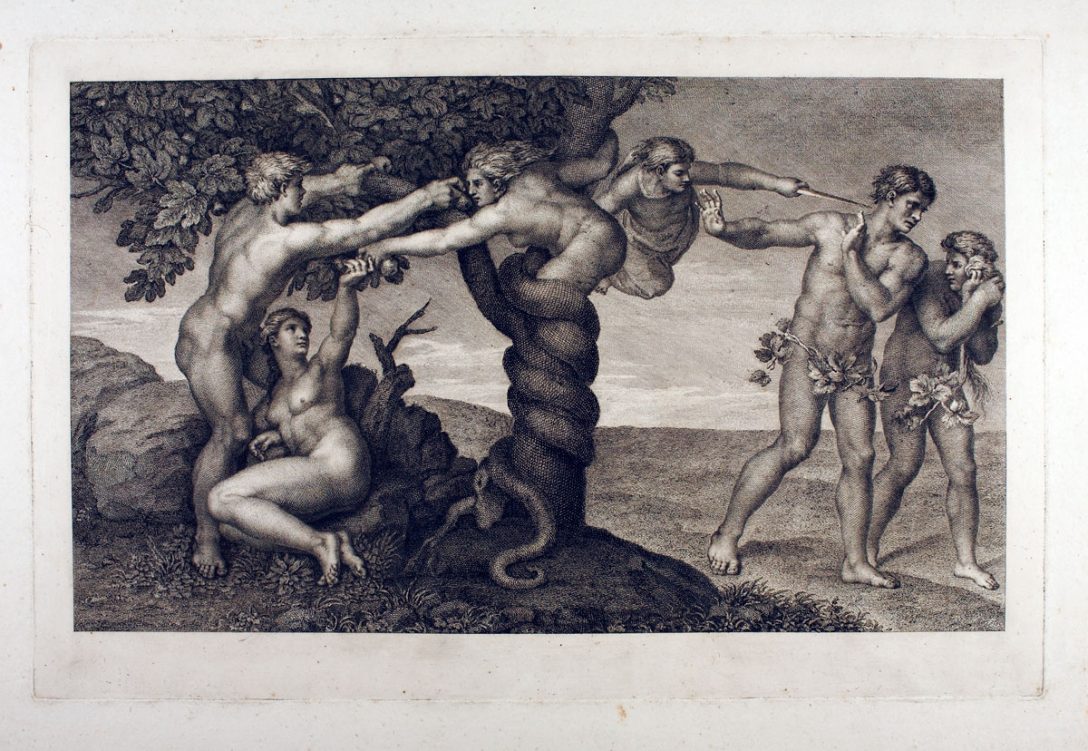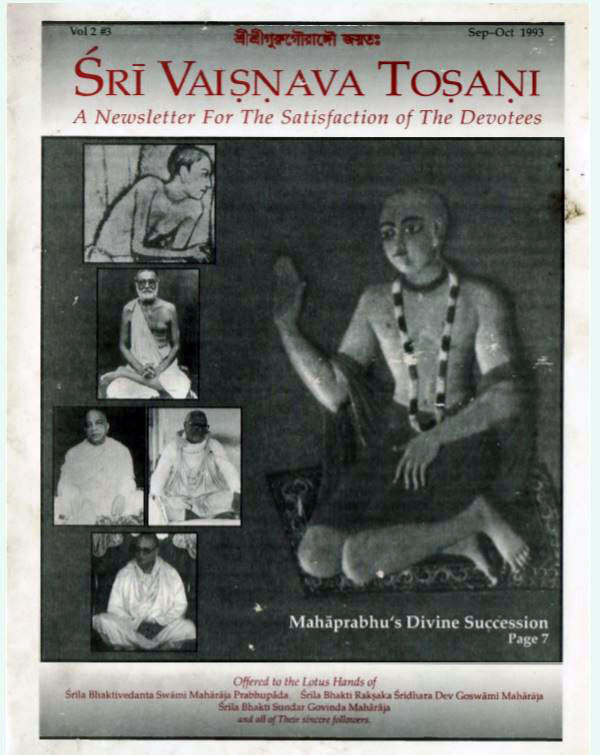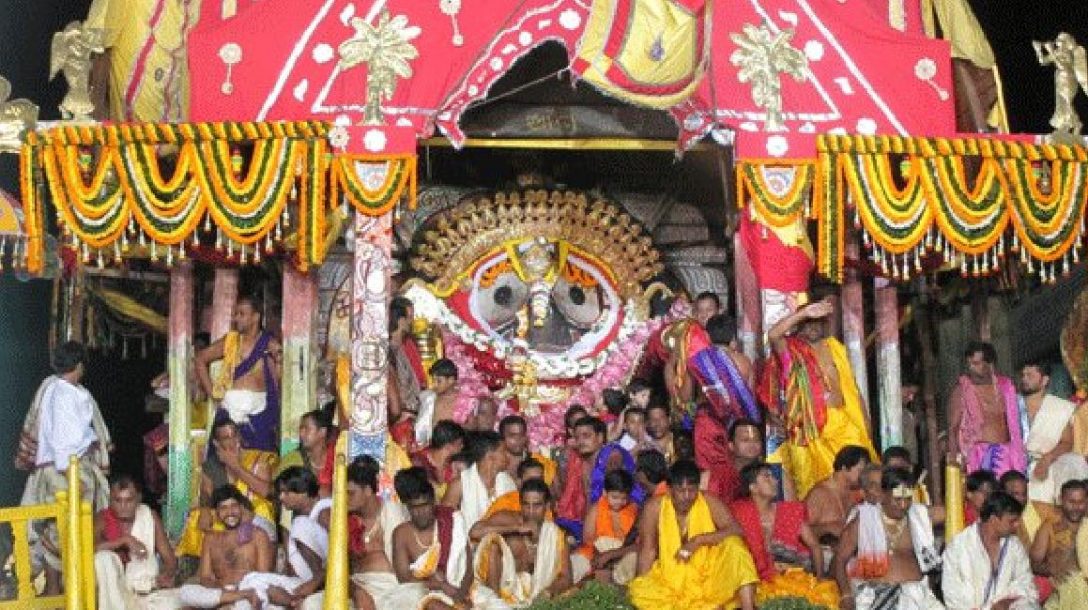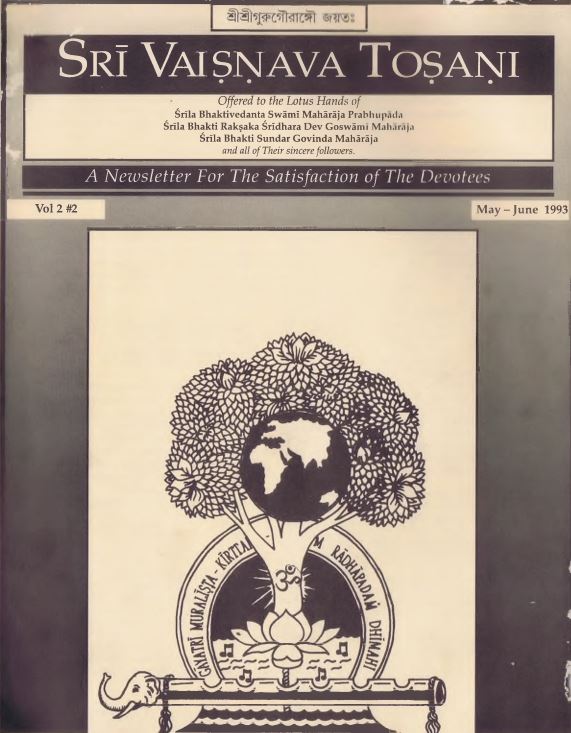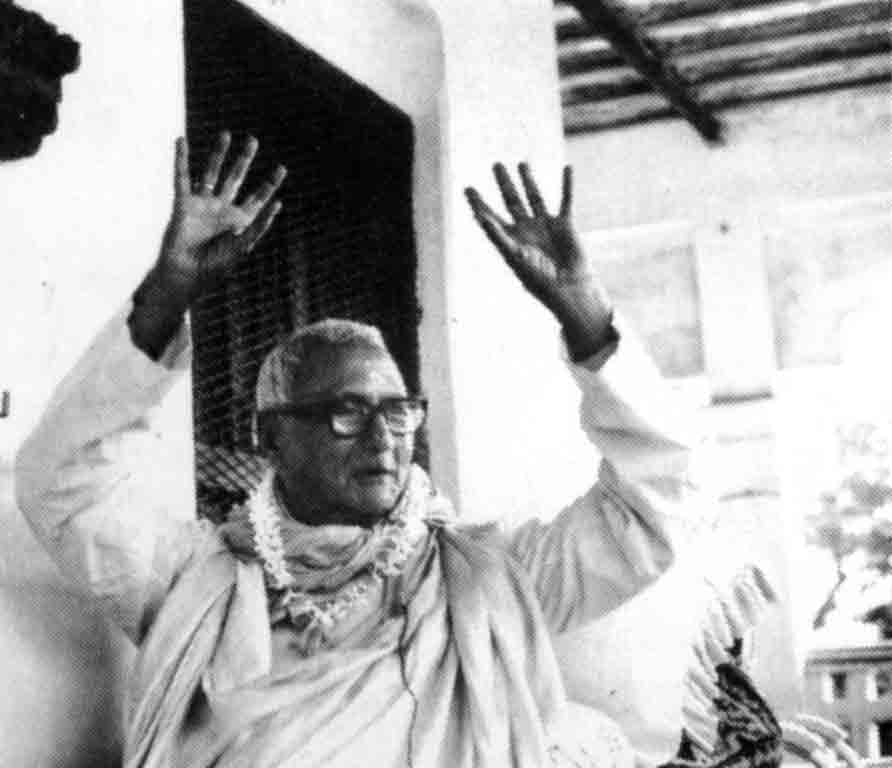Our Param Gurudev discusses preaching as the essence of kirtan, and the spirit of self-giving as indispensable behind all devotional practices.
You can find a full transcript and audio file of this talk here.
Question: Guru Mahārāj, very humbly I’d like to ask you a question concerning your book which I had a good opportunity to read yesterday for the first time. In the book I was very much surprised to see that the emphasis for spiritual enlightenment was in preaching, primary to japa. Japa was secondary to the preaching, the potency of preaching. And this very much surprised me because my spiritual master says that japa is the potency, the potency lies in the chanting of the Holy Name. How should I approach this?
Śrīla Śrīdhar Mahārāj: You have heard that Mahāprabhu laid stress on kīrtan. He recommended five main practices for our sādhana:
sādhu-saṅga, nāma-saṅkīrtana, bhāgavat-śravana
dhāma-vāsa, śrī-mūrtira śraddhāya sevana
sakala sādhana śreṣṭha ei pañcha aṅga
(Śrī Chaitanya-charitāmṛta: Madhya-līlā, 22.128–129)
[“One should associate with devotees, chant the holy name of the Lord, hear Śrīmad-Bhāgavatam, reside at Mathurā and worship the Deity with faith and veneration. These five limbs of devotional service are the best of all.”]
tāra madhye sarva-śreṣṭha nāma-saṅkīrtana
niraparādhe nāma laile pāya prema-dhana
(Śrī Chaitanya-charitāmṛta: Antya-līlā, 4.71)
[“Of the nine processes of devotional service, the most important is to always chant the holy name of the Lord. If one does so, avoiding the ten kinds of offences, one very easily obtains the most valuable love of Godhead.”]
Nām-saṅkīrtan, kīrtan, means to preach. The real principle, the real underlying meaning of kīrtan is to preach, to propagate.
Kīrtan, and everything, whatever is done, any form of devotion, must be devotion proper; and that means sevā, service. So our Gurudev said,
ataḥ śrī kṛṣṇa-nāmādi na bhaved grāhyam indriyaiḥ
sevonmukhe hi jihvādau svayam eva sphuraty adaḥ
(Śrī Bhakti-rasāmṛta-sindhu)
(“Although Kṛṣṇa’s Name, Form, Qualities, and Pastimes cannot be grasped by the material senses, through the spirit of dedication they manifest themselves on the tongue and to the other senses.”)
We want a connection with the super-subjective area, so only our hankering, sincere hankering for Him, and our attitude of surrender to His cause can attract Him to our level. That is transcendental; how can I come in connection with the transcendental? When I offer myself for His cause, His service. Then He will care to come down to give connection to me. So whatever transcendental affairs we are going to connect ourselves with, the sevonmukhata, this sort of spirit, attitude, must be there. Otherwise it will be only a repetition of mundane feats. Sevonmukhata, to practise to dedicate one’s own self, is mainly necessary. Whether we do kīrtan, śravaṇ, smaran, or vandan, everywhere this common factor must be present: that I want to dedicate myself for the cause of the higher, and not that I want to use the higher principle for my lower purpose. This tenor must be observed first.
And kīrtan means to preach. Saṅkīrtana tāra madhye sarva-śreṣṭha (“Of all practices of devotion, saṅkīrtan is the best”): it is difficult to control the mind, the inner aspect, but when we challenge some other person’s conception, we cannot but be all-conscious; we cannot talk irrelevantly, so we can easily have concentration when we talk about Him. That is kīrtan. When engaged in japam, my mind may wander here and there, everywhere, but when I am engaged in kīrtan, I must be all attentive, so we can control the mind which is very difficult to capture and to utilise. So kīrtanaṁ tu tato varam. Oṣṭha-spandana-mātreṇa kīrtanaṁ tu tato varam (Vaiṣṇava-chintāmaṇi): special stress has been put on kīrtan by Mahāprabhu.
Kīrtan means to preach. The environment has come and is prepared to attack me, so I shall rather make ‘offensive for offensive’—I shall attack the environment. Kīrtan means that. The whole environment is surcharged with the spirit of offensive; they are coming and attacking me from different directions, through different ideas that are already like spies within us, their agents. So, I shall take the offensive and attack the environment with the power that I received from Gurudev. That power will generate within me, and I shall attack the environment with that. That is what kīrtan means.
We are told, we have heard from our Gurudev, Bhakti Siddhānta Saraswatī, in this way, and we are trying to preach that thing to others. This is the tenor of his preaching. Preaching means to attack the environment, not to lie down passively and allow others to attack. Japam is very feeble, a weak thing: you begin japam, and whenever you awake you will find that your mind is marketing in some other place. But when you are talking about Kṛṣṇa, Mahāprabhu, to others, you cannot but be all attention. You can’t talk irrelevantly; you can automatically control your attention when doing kīrtan, when preaching. That is the advantage of kīrtan.
Our Vṛndāvan Dās Ṭhākur has also given another point. One who is doing japam is feeding himself, but one who is making kīrtan is feeding so many others. And he will receive that reaction, so his cause will be enhanced more and more. In this way we have understood it.
This is the justification of what is told in Search for Kṛṣṇa about kīrtan. Now you are to choose. I gave my explanation.
Sevonmukhe hi: our Gurudev laid stress in practising what is sevā. One must not only be disinterested, but one must be Kṛṣṇa-interested, Guru-interested. Guru is the agent representing Kṛṣṇa’s cause, and setting aside all my tendencies within, I shall surrender to the dictation of Gurudev. I shall ignore my inner impressions, and their suggestions, and inviting only what is coming from high, through my Gurudev, I shall do that. That is to practise and acquire the habit of service: self-abnegation, and to invite some higher tendency to work within me. Thereby we can acquire, we can know, we can understand what is service proper, sevonmukhata. Self-abnegation, and inviting the higher tendency to work within me with all my efforts. Total transformation is necessary through the agency of the higher world, and with that attitude I shall take the Name. Whatever I shall do, that attitude, that life must be present there, of sevonmukhata: what I am doing is not for me, but for the centre, for Kṛṣṇa. And the guarantee is Gurudev, the agent. This is the explanation.
Devotee: So japa is rather a prayer that we want to do kīrtan.
Śrīla Śrīdhar Mahārāj: It is within. Japa is within, and the disturbance is able to attack. And also, others are not being benefitted there. What did Mahāprabhu do? He is the pioneer of saṅkīrtan, not of japam.
kalau saṅkīrtanādyaiḥ sma kṛṣṇa-chaitanyam āśritāḥ
(Bhāgavat-sandarbha, verse 2)
yajñaiḥ saṅkīrtana-prāyair yajanti hi sumedhasaḥ
(Śrīmad Bhāgavatam: 11.5.32)
(“In the Age of Kali, intelligent persons perform congregational chanting to worship the incarnation of Godhead who constantly sings the name of Kṛṣṇa. Although His complexion is not blackish, He is Kṛṣṇa Himself. He is accompanied by His associates, servants, weapons and confidential companions.”)
Mahāprabhu came for saṅkīrtan. Japam is sevā mānase karibe. In Mahāprabhu’s instructions to Raghunāth Dās Goswāmī he says,
[grāmya-kathā nā śunibe, grāmya-vārtā nā kahibe]
bhāla nā khāibe āra bhāla nā paribe
amānī mānada hañā kṛṣṇa-nāma sadā la’be
vraje rādhā-kṛṣṇa-sevā mānase karibe
(Sri Chaitanya-charitamrta: 3. 6.236–237)
(“Do not talk like people in general or hear what they say. You should not eat very palatable food, nor should you dress very nicely. Do not expect honour, but offer all respect to others. Always chant the holy name of Lord Kṛṣṇa, and within your mind render service to Rādhā and Kṛṣṇa in Vṛndāvana.”)
Vraje-sevā is not for the public. If you are in that stage, you will continue that within yourself, within your mind, and not publicly. And before we reach that stage, we shall do everything publicly. Amānī mānada [we shall give respect without expecting it in return]. And our nature will be the spirit of toleration, and also to avoid causing any unnecessary disturbance to the environment, as much as possible.
Devotee: So that means we are attacking the environment, but we can’t disturb the environment.
Śrīla Śrīdhar Mahārāj: But our attitude should be passive, cool, that of a master, a master-like attitude. We shall attack our enemy, but the process must be grand, not like a weak man. We shall attack our enemy with dignity, with a dignified attitude. At heart we shall be well-meaning, “I want his good, and my cause is infinite, and he is within a teeny shell taking shelter.” We shall take a dignified position.
tṛṇād api sunīchena taror api sahiṣṇunā,
amāni[nā mānadena kīrtanīyaḥ sadā hariḥ]
(“The Lord’s Name may be always chanted by one who is more humble than a blade of grass, tolerant like a tree, free from desire for respect, and who offers respect to others.”)
And my attack will be of such nature that it will invite universal force for my backing, support.
Rāmānuja had a discourse with a māyāvādī for fourteen days, a strong fight. But Rāmānuja could not crush him. Then he came and prayed to Varadarāja, “What is this? You have accepted me as the Āchārya of a particular group, and I cannot defeat that māyāvādī. So what will be, Varadarāja? It is a very insulting position that I have created for You. I am now nothing, nowhere.” Anyhow, the engagement was there, Rāmānuja had to go and face his strong opponent; and as soon as he went, that māyāvādī fell at his feet, “Yes, I have recapitulated what you told in my mind, and that is true; and what I have told, that is false. I could understand.”
Our power is above. Varadarāja willed, and he at once fell at the feet. So, we must always be conscious of our Gurudev, Mahāprabhu. We are teeny persons, what power have we got? All our capital, the source of our success, is above our head with the Vaiṣṇava, with Guru. With this attitude we are to fight. Not to create our own egoism, to develop our own egoism; not for that, but for His cause. We are to go on in this way, with all sincerity.
When fighting with others, if I came to such a position that I couldn’t follow things properly, I used to ask myself, “Why am I here? What is my cause? Why am I supporting this?” Then I got my answer from within, “For this reason I am here.” So in that way, in many places, I could cross the layer of the oppositionist. “Have I come here with some ulterior motive, or with some sincere and higher motive?” Then if I analyse that, it will come out why I have come. “Why have I not gone to attend the māyāvādī school? Not the karmi school, not the patriots, nor others—why have I not joined them? Instead I have exclusively joined Mahāprabhu—why? What attracted me?” In this way.
Devotee: Now I have understood, but at the same time I’m much more in a turmoil, because I raised this point with my Gurudev and he said we are bhajanānandī, we are not goṣṭhyānandī…
Śrīla Śrīdhar Mahārāj: You may ask your Gurudev, and he may explain to you further, what is more private instruction for you: “I came to read this book, and there the stress is laid on the kīrtan, and the service, and you say japam. How can we harmonise, adjust?” You may ask him. And as he will tell, you do.
Devotee: There is one other question I would like to raise Mahārāj. When does one come to the understanding that one is serious? When do we come to the point when we are taking Harinam seriously?
Śrīla Śrīdhar Mahārāj: Harinam begins from the lowest position and goes up to the highest. Even the most fallen can get Harinam with only the connection of the sadhu. It is for all; at all possible stages, at all possible of fallen states, Harinam can help us. And at the same time, it goes to the highest position. But the meaning, the development in the Name, will change through the taker. By the devotee’s taking the Name of Kṛṣṇa, the whole nerve is getting jerked. And ordinary people, what will they get? They will wholesale will be attracted; it will draw the extract and take to Kṛṣṇa. The sound will squeeze our existence, our dedication, and take it to Kṛṣṇa. The result will be different depending on who is chanting, but anyone can take the Name. Rādhārāṇī is taking the Name of Kṛṣṇa. So many things may be: it is infinite. It is not finite, that we shall draw a line, “So far and no further.” It is all infinite: the sound is infinite, the figure, rūpa, colour. It is all infinite, different aspects of the infinite.
Rādhārāṇī says, “My life is sure to meet disaster and despair.” Why? She is saying to Her friends: “I have heard the Name of Kṛṣṇa, and I have surrendered fully there. I have seen the portrait of Kṛṣṇa and I have surrendered.” She does not know, still now, that the Name of Kṛṣṇa and the portrait are one and the same. So She is representing it in this way: “I have heard the Name, and I surrendered completely there. Again I found a picture, and I surrendered to that picture. And another, I heard the flute sound, and I surrendered there. So I have surrendered in three places, My friends, how can I get peace in My mind? So My life is finished, gone. I am expecting a disastrous end, I am wholesale spoiled.”
But when those three come into one, the Name, and the flute, and the portrait, what degree of joy is there! The Name has attracted Her to be empty. So what is there and what is that Name to us? It is the degree of love and affection with which we do the work, do the Name, or do service to the Deity, or whatever form outside—the inner spirit will be the be-all and end-all, everything is there. With what attitude am I approaching? Self-giving, ātmā-nivedan, sarva-svātma-nivedane, is the very criterion: how far one has surrendered himself, to what degree, for the cause? All other functions will depend on this truth, with how much intensity he has dedicated to taking the Name, or to the service of Guru, or to the Deity, or whatever, to preach, whatever—but what is the intensity of the dedication for the satisfaction of the Lord.
The gopis are not engaged always in japam, or always taking the Name on the beads, but their every activity is attracting Kṛṣṇa towards them. So all our movements will be such that they will attract Kṛṣṇa; they will be meant only to satisfy Kṛṣṇa, and nothing else. We will not do with only the lip, or the mind, or the body, with all its limbs, but everything, wholesale transformation is necessary. We shall live and move for Him. Not for anything else. That is what is the desired end. We belong completely to Him, as His slave, and He can make or mar. He has got every right over me. He may play with me in any way He likes, as playdough. Our dedication towards Him will be so much, of such quality. We must reach there any how.

